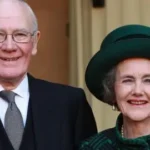Business
Former Lib Dem leader Menzies Campbell dies aged 84
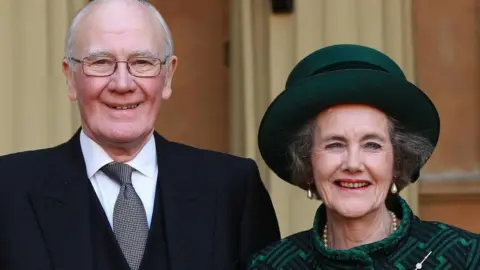
Read full article on post.
Catherine LystBBC Scotland
Former Liberal Democrat leader Lord Menzies Campbell has died at the age of 84.
Ming as he was widely known, led the Liberal Democrats from 2006 to 2007 and was the MP for North East Fife at Westminster for 28 years.
In his first career as a sprinter, he held the UK 100m record from 1967 to 1974 and ran in the 1964 Tokyo Olympics – being dubbed The Flying Scotsman.
Lib Dem leader Ed Davey described Campbell as “a dedicated public servant and a true Liberal giant”.
He said: “His principled leadership opposing the Iraq War was a mark of his morality, courage and wisdom.
“But more than that, he was an incredibly warm and caring friend and colleague. We will miss him terribly.”
Campbell died peacefully in London following a period of respite care. His grandson was with him.
His family said one of his final days was spent watching the Liberal Democrat conference, and enjoying watching video messages from political friends.
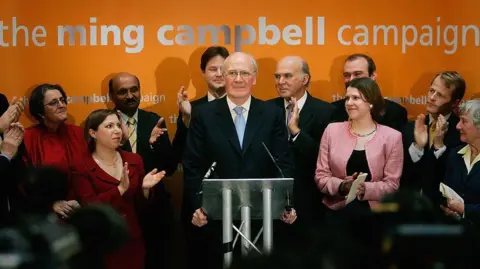 Getty Images
Getty ImagesCampbell first stood as a Liberal Party candidate in 1974, but did not win his constituency until 1987.
He made his name as the party’s foreign affairs spokesman, a position he held for 14 years and was a renowned critic of the Iraq war.
He became a member of the House of Lords in 2015. His official title was Baron Campbell of Pittenweem.
Expressing his condolences, Scotland’s First Minister John Swinney said Campbell was one of the country’s most “well-liked political figures”.
He said Campbell was “a passionate believer in a better Scotland” but also a strong internationalist – keen to build consensus and find common ground.
Swinney said: “Those entering public service today could learn much from his style – always forthright in speaking up for what he believed in, but never anything other than respectful, courteous and polite to his political opponents.”
Scottish Liberal Democrat leader Alex Cole-Hamilton MSP said Campbell was one of the “most respected politicians of his generation”.
He said: “The first political thing I ever did was to deliver leaflets for Ming on the morning of his first election to Parliament in 1987.
“He was my MP, he was my mentor and he was my friend. From the Olympic track to the benches of Westminster, his contribution to public life will long be remembered.”
Sir Nick Clegg, who succeeded him as Liberal Democrat leader, said he had a great interest and expertise in foreign affairs.
He said he was quite “in step” with mainstream policy thinking in this area, which made his intervention on the Iraq war more impressive.
On a personal level, he said he visited him earlier this month in a nursing home and was struck by his “unlimited, unqualfied devotion” to his late wife Elspeth.
“He spoke about when they first met. It was quite wonderful. You could see him transported back to the first time he set eyes on her,” he told the BBC’s World at One.
Wendy Chamberlain, current MP for North East Fife, said Campbell “remained a significant figure” in the area.
She added: “His contributions to our communities, to the University of St Andrews, as well as to Scotland and the UK were immeasurable.
“Although he found the passing of his beloved Elspeth difficult, rather than retreat, until the last weeks of his life, he was still travelling to London to contribute in the House of Lords.”
Born Walter Menzies Campbell on 22 May 1941, Cambell was brought up in a Glasgow tenement.
He was educated at Hillhead High School and went on to the University of Glasgow, where he was a contemporary of both John Smith and Donald Dewar studying Law and debating in the union.
He also attended Stanford University in California during the Vietnam War and later became an advocate.
Sprinting record
He was was called to the Scottish bar in 1968 and made a QC (latterly KC) in 1982. The law gave him a lucrative career and he continued to practise throughout his time in politics.
His wife of more than 50 years, Elspeth, died in June 2023 – he described her as his “constant political companion, always my encouragement and forever my first line of defence”.
The couple were married in June 1970, just three months after first meeting.
During his athletics career, Campbell captained the British men’s team at the 1966 Commonwealth Games in Jamaica.
A year later he set a new British 100m record of 10.2 seconds – beating a young OJ Simpson in the process. The record stood until 1972.
At one point he was known as “the fastest white man on the planet”.

Menzies Campbell’s contribution to our politics was far greater than his short spell as party leader suggests.
His was an extremely well informed voice on defence and foreign affairs which was central to the public debate during and after the Iraq war.
He and his late wife Elspeth were the best of political company with a great deal of insight into the Westminster issues and characters of the day.
In many ways Elspeth was more ambitious for her husband than he was for himself. His period as party leader was not a happy one.
He was on the receiving end of a persistent ageism – caricatured as a grandfatherly figure with his best days behind him when compared with rival leaders like Tony Blair and David Cameron.
When appearing on TV for interview he always insisted on wearing a tie because he felt it was what his constituents would expect.
But I knew he’d given in to modernising advisers who wrongly thought they could reinvent his image when one Sunday morning he appeared in our studio in an open-necked shirt. It was not long before he resigned.
It was his wisdom, experience and courtesy that were his greatest strengths and these were undervalued qualities during his time at the top.
Business
New digital ID will be mandatory to work in the UK, Starmer says
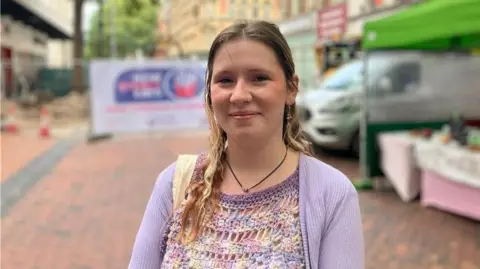
This post was originally published on this site.
Kate WhannelPolitical reporter
Digital ID will be mandatory in order to work in the UK, as part of plans to tackle illegal migration.
Sir Keir Starmer said the new digital ID scheme would make it tougher to work in the UK illegally and offer “countless benefits” to citizens, while his senior minister Darren Jones said it could be the bedrock of the modern state”.
However, opposition parties argued the proposals would not stop people crossing the Channel in small boats.
The prime minister set out his plans in a broader speech to a gathering of world leaders, in which he said it had been “too easy” for people to work illegally in the UK because the centre-left had been “squeamish” about saying things that were “clearly true”.
Addressing the Global Progressive Action Conference in London – attended by politicians including Australian Prime Minister Anthony Albanese and Canadian Prime Minister Mark Carney – Sir Keir said it was time to “look ourselves in the mirror and recognise where we’ve allowed our parties to shy away from people’s concerns”.
“It is not compassionate left-wing politics to rely on labour that exploits foreign workers and undercuts fair wages,” he said.
“The simple fact is that every nation needs to have control over its borders. We do need to know who is in our country.”
In a conversation following the speech, Sir Keir said he wanted the next election to be an “open fight” between Labour and Reform UK.
In response to the prime minister’s speech, Reform UK said the public was “waking up to the fact Starmer is just continuing the Tory legacy of high taxes and mass immigration”.
Despite having only five MPs, Nigel Farage’s Reform UK party has been leading in the opinion polls for several months.
The prime minister suggested facing the challenge of Reform would be a big focus when he addresses party members at the Labour Party conference next week.
Sir Keir’s government has been under pressure to tackle the issue of illegal migration, with more than 50,000 migrants arriving on small boats since Labour came to power.
Announcing his plans for the new digital ID scheme, Sir Keir said: “A secure border and controlled migration are reasonable demands, and this government is listening and delivering.”
“Digital ID is an enormous opportunity for the UK. It will make it tougher to work illegally in this country, making our borders more secure.
“And it will also offer ordinary citizens countless benefits, like being able to prove your identity to access key services swiftly – rather than hunting around for an old utility bill.”
Jones, who is the PM’s chief secretary, said: “If we get this digital ID system working and the public being with us, that will be the bedrock of the modern state and will allow for really quite exciting public service reform in the future.”
The government has said it wants to ensure the scheme works for those who are not able to use a smartphone and will launch a consultation on how the service will be delivered later this year.
The consultation is expected to last three months, with legislation being introduced to Parliament early next year.
There will be no requirement for individuals to carry their ID or be asked to produce it, Downing Street said.
However, digital ID will be mandatory as a means of proving right to work in the UK by the end of the Parliament, expected to be 2029 at the latest.
The new digital ID will be held on people’s phones, in a similar way to contactless payment cards or the NHS app.
It is expected to include a person’s name, date of birth, nationality or residency status and a photo.
The consultation will also consider whether additional information such as an address should be included.
Employers already have to carry out checks on prospective candidates.
Since 2022, they have been able to carry out checks on passport-holding British and Irish citizens.
There is also a Home Office online scheme which can verify the status of a non-British or Irish citizen, whose immigration status is held electronically.
However, it is understood that officials have been exploring whether a digital ID scheme could reduce the use of fake documents and provide a more consistent approach to verifying workers’ identity.
The government said the roll-out would eventually make it simpler to apply for services like driving licenses, childcare and welfare – as well as streamlining access to tax records.
Another Labour prime minister, Sir Tony Blair, tried to introduce compulsory ID cards but the idea was scrapped by the Conservative – Lib Dem coalition in 2010.
However, Sir Keir has recently said he believes the debate has “moved on in the last 20 years… we all carry a lot more digital ID now than we did”.
Labour believes its new proposal has public support, although more than a million people have signed a petition against the idea.
Conservative shadow work and pensions secretary Helen Whately said she could “see the rationale” for ID to make sure people are living in the UK legally but that her party was “opposed to mandatory, compulsory ID cards”.
She told BBC Radio 4’s Today programme the Labour government’s proposals would “make law-abiding people have to jump through more hoops and employers have more red tape, while in the grey economy illegal working will just go on”.
“That’s why it is not an answer to the problem of stopping the boats,” she added.
Liberal Democrat leader Sir Ed Davey said his party would “fight tooth and nail” against the scheme which would “add to our tax bills and bureaucracy, whilst doing next to nothing to tackle channel crossings”.
A Reform UK spokesperson said that government plans were a “cynical ploy to fool voters that something is being done about illegal immigration”.
The SNP-led Scottish government has said it is “opposed to the introduction of any card that is compulsory to have, compulsory to carry or that anyone can demand to see, including that of a digital ID”.
First Minister of Northern Ireland, Michelle O’Neill, called the proposal “ill-thought out” and “an attack on the Good Friday Agreement and on the rights of Irish citizens in the North of Ireland”.
‘Everyone hacks everything’
BBC Newsbeat has been asking young people for their thoughts on the government’s plans.
Emlyn Jenkins, 23, is against digital IDs, describing the plan as “fascistic and horrible”.
“How will people who are homeless be affected if they don’t have access to a smartphone or they don’t have access to consistent internet?” she asked.
Arianwen Fox-James, 20, says she can see some practical benefits but is uncomfortable with the idea of a “centralised hub of all the data”.
“If the government really wanted to deal with people working illegally, they’d make the immigration process easier and they’d make it more accessible for people,” she says.
Amy, 22, says she and her friends would welcome having digital ID on a night out.
“It’s the one thing people do forget,” she says. “But if it’s on your phone, people always have it in their hand.”
But she also worries about data safety. “Every time these things get launched they get hacked,” she says. “Everyone hacks everything.
Business
Ex-Reform politician admits Russia-linked bribery charges

Read full article on post.
Miriam BarkerBBC Wales and
David DeansWales political reporter, The Old Bailey
The former leader of Reform UK in Wales has pleaded guilty to bribery charges relating to making statements in favour of Russia while being an elected member of the European Parliament.
Nathan Gill, 52, from Llangefni on Anglesey, admitted eight counts of bribery between 6 December 2018 and 18 July 2019, but denied one charge of conspiracy to commit bribery.
It was alleged he made statements in the European Parliament which were “supportive of a particular narrative” which would “benefit Russia regarding events in Ukraine”.
Gill will be sentenced in November and his defence barrister said he expected jail.
The charges stated that Gill, as an elected member of the European Parliament for the constituency of Wales in the UK, “agreed to receive financial advantage, namely money”, which constituted “the improper performance” as the holder of an elected office.
He also made these statements in opinion pieces to news outlets, such as 112 Ukraine.
The court was told he was tasked by Ukrainian Oleg Voloshyn on at least eight occasions to make specific statements in return for money and there was evidence of WhatsApp messages between the two men.
Mr Voloshyn is a former member of the Ukrainian parliament for the pro-Russian Opposition Platform for Life party.
The conspiracy to commit bribery alleged Gill conspired with Mr Voloshyn and “others” between 1 January 2018 and 1 February 2020, and that he accepted “quantities of money in cash” which was “improper performance by him of his function or activity as the holder” of a position in the European Parliament.
Prosecutor Mark Heywood KC said the guilty pleas were “satisfactory” because the bribery charges reflected the criminal activities, and agreed to lie the conspiracy charge on file.
They emerged after Gill was stopped at Manchester Airport on 13 September 2021 under the Counter Terrorism and Border Security Act 2019.
Peter Wright KC, speaking for Gill, told, the court: “It is recognised that it is inevitable that the defendant will receive an immediate sentencing to prison.”
Mrs Justice Cheema-Grubb told the court: “This is a serious matter.”
She said Nathan Gill had “admitted having asked questions, made statements and carried out other activities” in or connected with the European Parliament in support of pro-Russian parties in the Ukraine conflict.”
She added that he had pleaded guilty on the “full facts” as disclosed by the Crown.
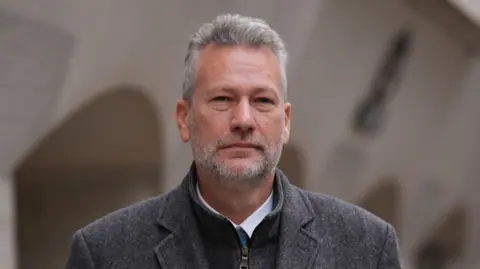 PA
PACdr Dominic Murphy, head of the Met’s Counter Terrorism Command, which led the investigation, said the team uncovered an elected MEP was “taking payments to peddle narratives” that would have had the effect of being beneficial towards Russian interests.
“The strength of the case put together by our investigation team working with the prosecutors has led to Gill pleading guilty to these offences today,” he said.
“This case goes to the heart of our democratic values and as we’ve shown here, we will not hesitate to investigate and disrupt anyone seeking to harm or undermine these values and our national security.”
Who is Nathan Gill?
Nathan Gill served as a UKIP and Brexit Party MEP between 2014 and 2020, and was leader of UKIP Wales between 2014 and 2016.
He then served leader of Reform UK Wales between March and May 2021, leading the party’s Senedd/Welsh Parliament election campaign.
However he is no longer a member of the party.
Business
Nursery worker jailed over abuse of 21 babies

Read full article on post.
A 22-year-old nursery worker has been jailed for eight years for multiple counts of child cruelty after abusing 21 babies.
Roksana Lecka, from Hounslow, west London, admitted seven counts of cruelty to a person under the age of 16 and was convicted after a trial of another 14 counts over her “gratuitous” and “sadistic” actions at two nurseries. She was found not guilty of three counts of child cruelty.
Her crimes were discovered in June last year after she was sent home for pinching a number of children at Riverside Nursery in Twickenham, south-west London.
Parents of Lecka’s victims told of their feelings of heartbreak, guilt and distrust in victim impact statements at Kingston Crown Court.
Judge Sarah Plaschkes KC told the defendant: “You committed multiple acts of gratuitous violence.
“You pinched, slapped, punched, smacked and kicked them. You pulled their ears, hair and their toes. You toppled children head first into cots. You caused bruising and lingering red marks.
“When you committed these acts of cruelty you would look at the other members of staff to make sure that they were not watching you.
“Often the child would be quietly and happily minding their own business before you deliberately inflicted pain causing the child to cry, arch, try to get away or writhe around in distress.”
Lacka pinched several children dozens of times in the course of one day, causing them to cry and flinch away from her, the Crown Prosecution Service previously said.
On one occasion she kicked a little boy in the face several times. She was also seen to push babies head first over cots and cover a toddler’s mouth when they started to cry.
Police said she had abused children at two nurseries between October 2023 and June 2024 – one of the counts related to Little Munchkins in Hounslow, with the remainder linked to the Riverside Nursery in Twickenham, which has since closed.
‘Totally helpless’
A number of parents took to the stand on Friday to address a packed court over the impact of Lecka’s abuse.
One mother looked directly at Lecka as she said: “These children were so innocent and vulnerable.
“They couldn’t speak, they couldn’t defend themselves and they couldn’t tell us as parents that something had happened to them.
“They were totally helpless and Roksana preyed upon them.”
‘Threat to society’
Another mother, referencing the CCTV footage, said: “This really highlighted how defenceless all the children were and how sickening Roksana’s crimes were to target such young babies.”
A different mother said: “I think Roksana is a huge threat to society.
“It is objectively shocking that she has been hiding in plain sight in society up until she was arrested. I think all of us can agree that only the worst kind of human would assault vulnerable babies.”
Parents detailed the guilt they feel about placing their children in Lecka’s care, with one mother, whose son the defendant kicked in the face, telling the court: “We weren’t there to protect them.”
The court heard one family has moved away from London altogether, while other sets of parents have suffered breakdowns in their relationship after Lecka’s actions.
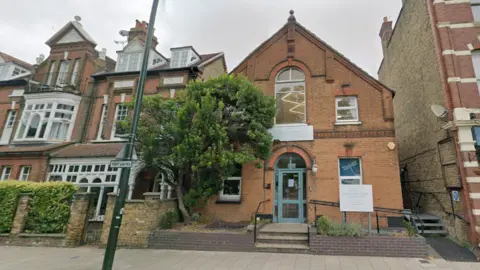 Google
GoogleArlette Piercy, representing Lecka, said her client had expressed remorse and cited her previous good character and young age in mitigation.
The court heard Lecka wrote a letter to the court saying she had reflected on her actions, wanted to apologise to parents and that cannabis turned her into a different person.
Ms Piercy told the court that Lecka had been attacked in custody, describing her experience in prison as having been “extremely challenging”, and said she had spent time in the vulnerable prison wing.
Lecka worked at Riverside Nursery between January and June 2024, with a number of parents reporting unusual injuries and bruising in March and May that year.
The court heard she was addicted to cannabis and vaping around that time, which she did not tell the nursery.
Det Insp Sian Hutchings, from the Met Police, said: “Today’s sentencing concludes a complex and emotional investigation.
“The victims in this case are just babies, with the youngest being just 10 months at the time of the offences.”
She said officers investigating Lecka’s actions were shocked by “Roksana’s lack of accountability and her inability to explain her unjustifiable actions”.
“I want to commend the strength of the parents throughout this investigation. I can’t imagine how horrendous it’s been to sit in court and listen to the abuse that Lecka inflicted on their children,” Det Insp Hutchings added.
‘Serious questions remain’
Jemma Till, a lawyer representing families, said: “Those parents we’re supporting remain devastated by the ordeal their children have been put through by Lecka. She abused her position of trust in the cruellest way over a number of months.”
She said that while families welcomed Lecka’s sentence, “serious questions remain as to how Lecka’s abuse was allowed to go unchecked for several months”.
“Our focus is now on securing families, who will continue to be affected by Lecka’s actions for years to come, with the further answers they deserve,” she added.
-
Politics3 days ago
European Parliament snubs Orbán with vote to shield Italian MEP from Hungarian arrest
-
Culture3 weeks ago
Life, loss, fame & family – the IFI Documentary Festival in focus
-
Health4 days ago
EU renews support for WHO’s Universal Health Coverage Partnership
-
Environment7 days ago
Key oceans treaty crosses threshold to come into force
-
Culture2 months ago
Fatal, flashy and indecent – the movies of Adrian Lyne revisited
-
Culture3 days ago
Twilight at 20: the many afterlives of Stephenie Meyer’s vampires
-
Culture1 week ago
Farewell, Sundance – how Robert Redford changed cinema forever
-
Culture3 weeks ago
What is KPop Demon Hunters, and why is everyone talking about it?
























